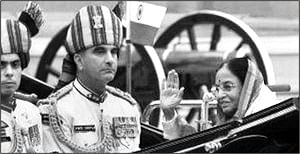Law analysis
President's constitutional powers:
Case of India
Sinha M A Sayeed
 Article 52 of the Constitution of India reads: There shall be a President of India. Article 53(1) states: The executive power of the Union shall be vested in the President and shall be exercised by him either directly or through officers subordinate to him in accordance with this constitution.
Article 52 of the Constitution of India reads: There shall be a President of India. Article 53(1) states: The executive power of the Union shall be vested in the President and shall be exercised by him either directly or through officers subordinate to him in accordance with this constitution.
Article 74(1) says: There shall be a Council of Ministers with the Prime Minister at the head to aid and advise the President who shall, in the exercise of his functions, act in accordance with such advice; provided that the President may require the Council of Ministers to reconsider such advice, either generally or otherwise, and the President shall act in accordance with the advice tendered after such reconsideration.
Therefore, it is clear that Constitution of India, on the question of the exercise of the powers of the President of the Republic, made Article 53(1) subject to Article 74(1) which means former shall be read with the latter.
But Article 217(3) contains: If any question arises as to the age of a judge of a High Court, the question shall be decided by the President after consultation with the Chief Justice of India and the decision of the President shall be final.
Therefore, it is also made clear by the Constitution that while determining the age of a judge of the High Court President is to act on the advice of the Chief Justice of India, and not the Prime Minister.
This is more interesting to note that in Shamsher Singh v State of Punjab, the Supreme Court of India has laid down three circumstances under which the President need not accept the advice of the Prime Minister, viz: (i) Dismissal of Government; (ii) Choice of Prime Minister; and (iii) Dissolution of Lok Sabha. (AIR 1974 SC 2192).
While dealing with the constitutional powers of the President of India we find, to speak the truth, the repetition of similar fashion in the Constitution of Bangladesh that has made its Article 48(2) -- The President shall, as Head of State, take precedence over all other persons in the state, and shall exercise the powers and perform the duties conferred and imposed on him by this Constitution and by any other law -- subservient to Article 48(3).
In the exercise of all his functions, save only that of appointing the Prime Minister pursuant to Clause (3) of Article 56 and the Chief Justice pursuant to Clause (1) of Article 95, the President shall act in accordance with the advice of the Prime Minister.
Despite similarities, prima facie differences between them appear as follows:
President of India is constitutionally empowered to determine the age of a judge of the High Court without consultation with the Prime Minister, which his Bangladesh counterpart does not have.
President of India has further been empowered by the Supreme Court of India to act under three circumstances without consultation with the Prime Minister but the Supreme Court of Bangladesh has not yet emboldened our President with any of such powers.
President of India enjoys certain powers because of federal/quasi-federal structure of the government, which the President of Bangladesh does not have on account of its being unitary structure of the government.
But, curiously enough, in case of appointing the Chief Justice of Bangladesh President under Article 48(3) does not need to act on the advice of the Prime Minister that his counterpart in India does need or the constitution of India has not stated anything specifically as ours.
The writer is a senior fellow of CGS and faculty member of Newcastle Law Academy.